Rayevskys in the history of Russia
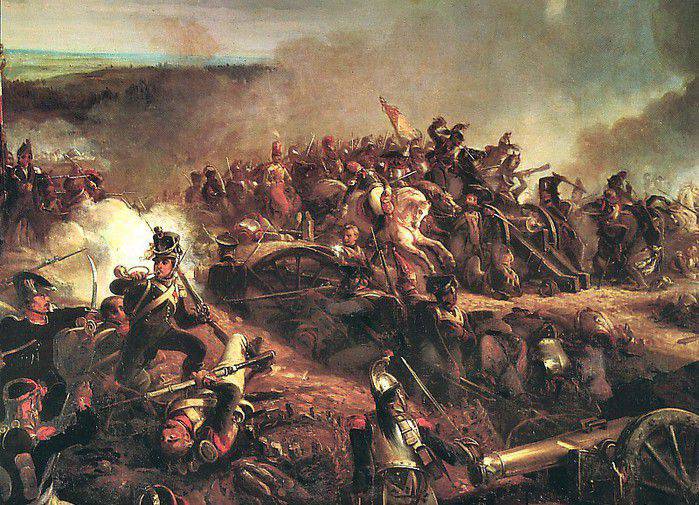
In people's memory, their unwritten laws, their own countdown, their heroes. The sacred memory of them is passed down from generation to generation as a symbol of valor and service to the Fatherland. It also happens that the son, grandson, great-grandson multiply the good name and glory of the ancestor. This glorious series is never long, the path to it is too difficult, and few genera are able to stand in this line. But just such was the glorious race of the Rajevskis — patriots, George Knights, Russian generals and officers.
It should be said that Alexander Sergeevich Pushkin dedicated his heroic-romantic poem “The Prisoner of the Caucasus” to one of the representatives of this old family.
The martial generals were the father and son of the Raevskys. The Raevsky family in Russia was famous and famous. The most striking figure was, perhaps, Nikolai Nikolayevich Raevsky Sr. General, commander of the Seventh Infantry Corps, George Knight, hero of World War 1812. In the battle of Borodino, he commanded the center of the Russian army. "In danger, he is a true hero, he is charming, his eyes flare up like embers, and a noble posture becomes majestic", - so about N.N. Raevsky-father wrote K.N. Batiushkov. Kurgan height on the Borodino field, unknown before the hill in the middle of the Russian Plain, was in the center of events that decided the fate of the Fatherland. This hill, which embodies the prowess of the Russian weapons, subsequently given the name Rajewski.
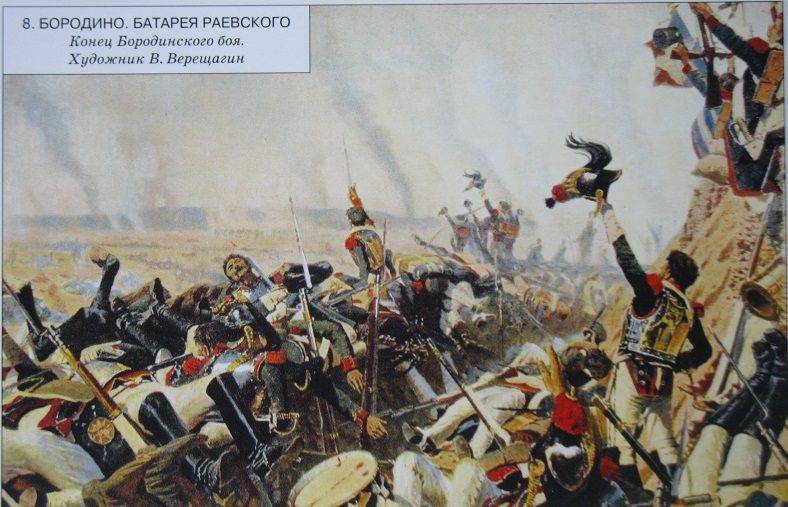
It was here, on Raevsky's battery, in the 1839 year, after several requests from Denis Davydov to Nicholas I, that Peter Ivanovich Bagration, one of the most courageous generals of the Russian army, was buried. Why was Davydov so busy? For two reasons. First, Bagration earned the right to be buried in the Borodino field, where he received a mortal wound. Secondly, the village of Borodino was the family estate of Denis Davydov, and he considered it a duty of hussar honor to take all the efforts to rebuild the body of Prince Bagration from the town of Sima, Vladimir province.
The Raevsky juniors were boys when their father under Saltanovka led them to attack along with the Smolensk regiment. There are few in stories Russia has similar examples of such a unity of fate and the views of a father and son. Their life and service are associated with the Nizhny Novgorod Dragoon Regiment. Rajevsky, a senior lieutenant colonel, commanded this regiment during the 1796 Persian campaign. The victorious completion of the company coincided with the demise of Empress Catherine II and the ascension to the throne of Paul I. With him, many Russian commanders were out of work. General Rajevsky was also removed from the service.
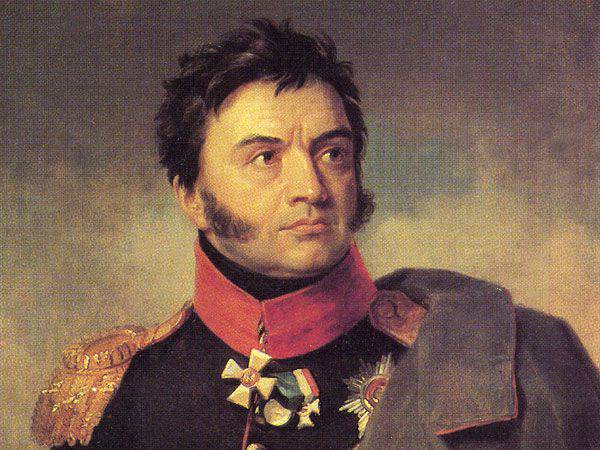
As time went on, a young lieutenant Nikolai Nikolayevich Rajewski Jr. arrived in the Caucasus. He was enlisted in the Nizhny Novgorod Dragoon Regiment, the regiment of his father. He participated in battles with the Persians under the command of General Yermolov. And at the end of the Russian-Persian war, he returned with a regiment to Kakheti to winter apartments in the Tsarsky Wells and Karagach. At the age of twenty-six, Rayevsky-the son received the rank of general and was appointed commander of the Nizhny Novgorod regiment. This happened thirty years after his father commanded the regiment.
About remarkable courage and decisiveness with which General Nikolai Nikolayevich Rajewski Jr. did everything in his power to alleviate the plight of demoted Decembrist officers serving in the regiment, alas, not much is known. Raevsky knew some of them even in St. Petersburg, met others in the Caucasus, and treated them like friends. The command was aware of General Rajewski's indulgences and repeatedly reprimanded him for his “meek attitude towards state criminals.”
It is believed that Rajewski Jr. had nothing to do with secret societies. This opinion was promoted by the fact that after the defeat of the 1825 uprising of the year, he did not suffer any punishment. But preserved and evidence that suggests otherwise. Decembrist Mikhail Bestuzhev, who knew the Raevsky family closely, wrote that Rayevsky-son was a member of the Southern Society. Similar information is in the records of the Decembrist A.E. Rosen. After the company was opened, Rajewski was arrested. He managed to escape the court allegedly because Nicholas I forgave him and transferred to serve from the Kharkov province to the restless Caucasus. The fact that he could not stand aside from the conspiracy, shows another circumstance. The Decembrists of Raevsky Jr. were related by kinship: his uncle, Vasily Lvovich Davydov, was one of the organizers of the Southern Society, and his own sister, Maria Nikolayevna, was the wife of the Decembrist Volkonsky. It was she who first went after her husband to Siberian exile.
There was another exile in the Raevsky family, Vladimir, who was called the “first Decembrist”. Although essentially he was not a Decembrist: he was exiled three years before the uprising for freethinking and sowing "sedition" among soldiers.
In confirmation of the sympathy of N.N. Raevsky's son to that patriotic movement (the Decembrists did not name the rebels at that time, only a quarter of a century later Herzen called them the first time, officially they were called as "villains" and "state criminals") such an episode is curious. Once, in 1828, the Tsar Wells arrived in the Nizhny Novgorod regiment, the exiled lieutenant Molchanov. His disgrace was associated with the Pushkin poem "Andrei Chenier". The poet literally glorified in him the French freedom fighter, who in 1794 took the death on the chopping block together with the poet Rouget. This poem has bypassed the whole of Russia. The royal senate brought it to the list of "harmful and prohibited." Those who kept, and even more spread the poem, were persecuted. Lieutenant Molchanov was among them, for which he was demoted as a private and banished to the Caucasus. Arriving there, he gladly learned that he would serve under the command of General Rayevsky.
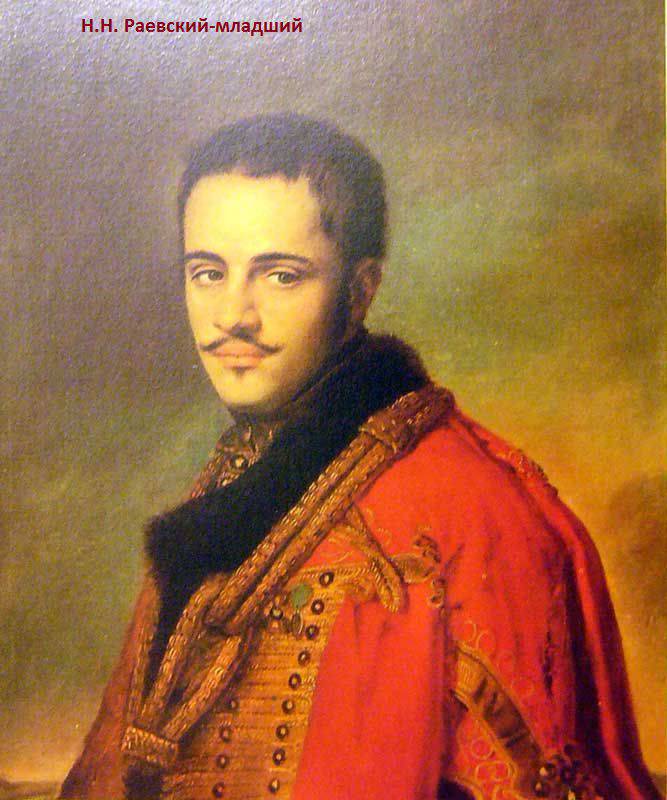
General Rayevsky-son was obliged to change the fate of the Decembrist N.N. Orzhitsky, pulling a soldier's strap in the Kizlyar garrison. Rajewski managed to achieve the transfer of Orzhitsky to the Nizhny Novgorod regiment, made sure that the officer exiled to the exiled writer and musician. Then the general dared to present Orzhitsky to the award. He did not receive the award, but the presentation opened the way for him to return to Russia.
Being in the town of Tsar's Wells, Rajewski Jr. applied to the General Headquarters for permission to leave. Taking it, he went on a trip to the Caucasus. He invited friends with him, including those who were demoted by the Decembrists. The names of all who went with him are unknown. But there certainly were Golitsyn, Bestuzhev-Marlinsky, Chernyshev, Semichev and Vortsel.
Having found out about this, the adjutant of the Minister of War Buturlin prepared a report to the emperor, in which he accused Rajewski in close communication with state criminals. From the General Staff followed the order for house arrest of the guilty. Execute the order entrusted to the colonel, the Georgian prince poet Alexander Chavchavadze. Chavchavadze, who knew and loved Raevsky well, refused such “honor”. The arrest, however, was soon canceled, but was removed from the command of the regiment of the general. Rajewski resigned and went to the Crimea.
But the retired general did not manage to quit forever. In 1837, the military situation in the Caucasus escalated, and Rayevsky was again invited to military service. In a short time he did much to establish good relations between the Russians and the highlanders. As before, he took care of those who fell into disgrace - this time in his regiment served as an ordinary exile poet A. I. Odoyevsky. In 1841, N.N. Rajewski retired again and now permanently settled in the Crimea.
Two years later, on the way to Moscow, he stopped to rest in his estate in the Voronezh province. There he fell ill and soon died. There he was buried ...
It was he, Nikolay Nikolaevich Raevsky-son, who was dedicated to Alexander Sergeevich Pushkin to the poem “The Prisoner of the Caucasus”.
On the banks of the South Morava River near the Serbian town of Aleksinac there is a small, dilapidated church of the Old Kiev style. At its walls is a slab of white Dalmatian marble with the inscription: “The Church in the name of the Holy Trinity, erected in 1902-1903. on the site of the heroic death of Colonel Nikolai Nikolayevich Raevsky, who died in the battle of Androvac 20 August 1876, for the liberation of the Slavs from the Turkish yoke. "
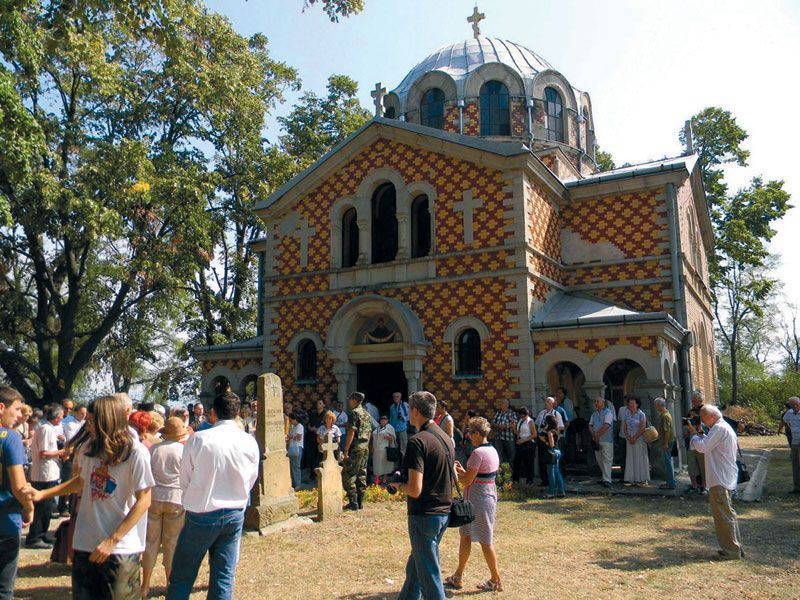
Here are some details. In 1876, the Serbian-Turkish war began. Three thousand volunteers came to the aid of the Slav brothers from Russia. Among them was Colonel N.N. Rajewski, grandson and son of famous generals Rajewski. In one of the cavalry attacks, he was mortally wounded by the nucleus. A Serbian officer, Vladan Dzhordzhievich, who witnessed this event, wrote down that day in a field diary: “The news of the death of Rajewski struck us. Most recently he was with us, he was so merry, and now he is dead. Poor Raevsky! May God console his mother and brother, for all their great wealth cannot comfort them at such a loss. ”
A quarter of a century later, the deceased's aunt, Maria Nikolaevna Volkonskaya-Rayevskaya, turned to the Yugoslav bishop Nikandru with a request to build a church nephew on the spot. After receiving permission, Maria Nikolaevna sent three hundred thousand rubles in gold and two chests with drawings, plans and maps. The construction was led by Italian architect I. Kolar, and the church was decorated by the famous Dalmatian painter D. Obrenovic.
This memorial church became widely known after the rumor that Colonel Nikolai Rajewski was a prototype of Count Vronsky in L.N. Tolstoy "Anna-Karenina". No wonder, apparently, on the last pages of the novel it is reported that Count Vronsky is leaving with a squadron in Serbia. There are also external similarities between Rajewski and Vronsky. According to Tolstoy’s description, Count Vronsky is a short, densely folded brunette with a good-naturedly handsome, extremely calm and firm face. Judging by the memoirs of contemporaries, this portrait coincides with the appearance of Rajewski, with his features imprinted on a posthumous engraving.
The stories of Russian officers about Raevsky-Vronsky were used more than once by Yugoslav writers and journalists. “Hero Tolstoy died in Serbia”, “Details of the death of Count Vronsky”, “The fate of one literary hero” - these are the headlines of articles published in the Yugoslav press in different years as a token of good memory of Nikolai Nikolayevich Raevsky-grandson.
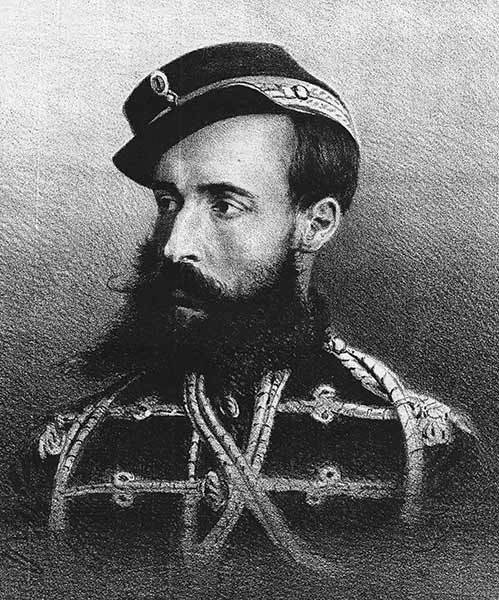
But this is not the end of the story about the Raevskys. Colonel Nikolai Nikolayevich Rajewski had a younger brother. Little is known about him. And his son Alexander was destined to write a new memorable page in an extraordinary chronicle of his ancestors. He was a St. George Knight, a wonderful pilot, journalist, writer. Alexander Rajewski died in the 1937 year.
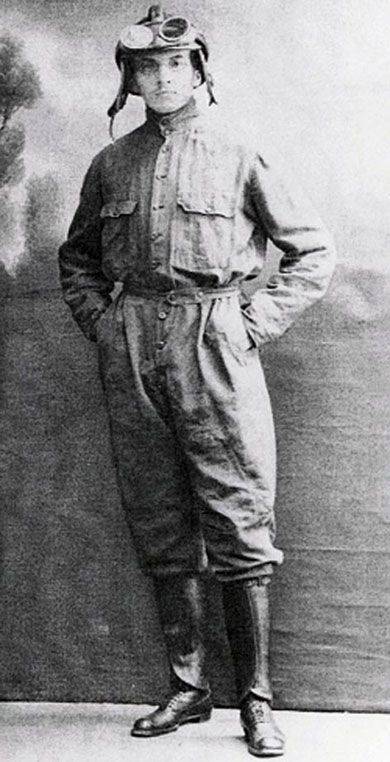
Sources:
Pochko N. A. General N.N. Rayevsky. M .: Moscow Worker, 1971. C. 27-28. 34-38
Ivanov I. Hero of the Patriotic War 1812. (On the 200 anniversary of the birth of gene. NN Rajewski) // Military-Historical Journal. 1971. No. 9. C. 23-26.
Tokarev V. Fathers and Sons. // Civil aviation. 1993. No. 3. S. 39-40.
Ekshtut S. A. Nikolay Raevsky // Motherland. 1994. No. 3-4. C. 40-42.
Information